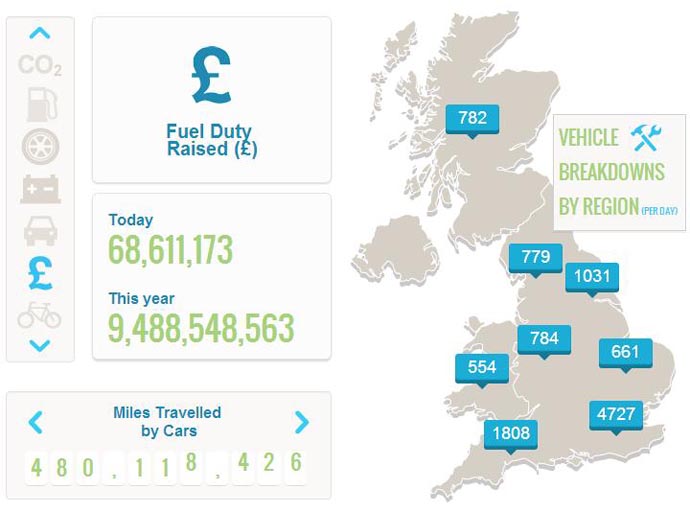Road clock counter reveals the astonishing amount of resources consumed, and pollution created, as a direct result of the way we travel each day.
Car breakdown provider, ETA, looked at the driving habits of 800,000 motorists over a three month period and used that information to provide a fascinating insight into how much money we motorists spend at the pumps and how much of that cash goes to the tax man – an eye-watering £1,000 per second. See more road stats at roadclock.com
Following calls by fuel campaigners for fuel pumps to display the amount of duty that motorists pay when they fill up, roadclock.com displays the amount we pay as a nation of drivers second by second as well as all manner of regional transport-related stats including miles driven, petrol and diesel consumed, bicycles stolen and where and when cars will break down around Britain each day.
Director at the ETA, Andrew Davis, said: “The modern car is such a convenient, easy-to-use and reliable machine that it’s easy to forget its hidden cost, not only in terms of how much duty is paid, but the far bigger impact we have on the environment”
Modern cars are far more reliable than they once were, but an estimated 11,000 break down across Britain each day. The ETA looked at the total number of car breakdowns suffered by 800,000 customers and used that figure to build a map of where Britain’s 30m cars need roadside assistance day by day and region by region.
By far the highest number of cars breakdown in the southeast of England – at 4,727 over six times more than in the whole of Scotland. There are an estimated 11,000 breakdowns across Britain each day, but the figure needs to be viewed in the context of the distance we drive. As a nation we drive over 650m miles every 24 hours, a staggering distance the equivalent of travelling to the moon and back over 1,300 times a day.
Find out how the road clock stats are calculated at https://www.eta.co.uk/road-clock-calculations/
Reduce the financial and environmental burden of driving
Making small changes to your driving style, and how you use your car while driving, can make big differences to your environmental impact.
Where possible drive with the windows up to reduce drag and make your fuel consumption more efficient.
Try not to be in a hurry. Stressed driving can be erratic and is uneconomical. Simply relax and try to enjoy the trip.
Air conditioning use should be limited as it uses more fuel.
Switch off the engine if you think you will stationary for more than two minutes.
Keep your speed down as driving at 50-60 mph means your emissions will be lowest. Driving over 70mph will rapidly increase your emissions. It can cost you up to 25% more in fuel to drive at 70mph compared to 50mph.
Avoid unnecessary revving or idling of the engine as this uses more fuel.
Harsh acceleration and braking can use up to 30% more fuel and can cause increased wear and tear on the vehicle.
Control your speed – Travelling at over 60mph dramatically increases your level of pollution.
Careful motorway driving will improve safety and traffic flow. The concertina effect caused by one motorist braking sharply often results in traffic slowing to a near stop due to the delayed reaction of drivers behind. If you leave a safe distance between you and the car in front, when you see a car brake up ahead, you will be able to simply remove your foot from the accelerator. You can almost make yourself responsible for stopping the concertina.
Drive less. Sounds obvious, but around 4 million of us drive 3 miles to work each day – a distance that takes only 15 minutes by bike. Even if you cycle to work once a week over the summer you’ll be saving money and doing your bit for the environment.
Breaking down less often
Just like people, cars need a little more care the older they get. The number one reason for cars breaking down is a flat or faulty battery, but the best way to becoming stranded at the roadside is to ensure your car is properly serviced, particularly as it gets older. And with breakdown cover from less than £30 a year, there’s no excuse for not having that in place just in case.

0 Comments View now